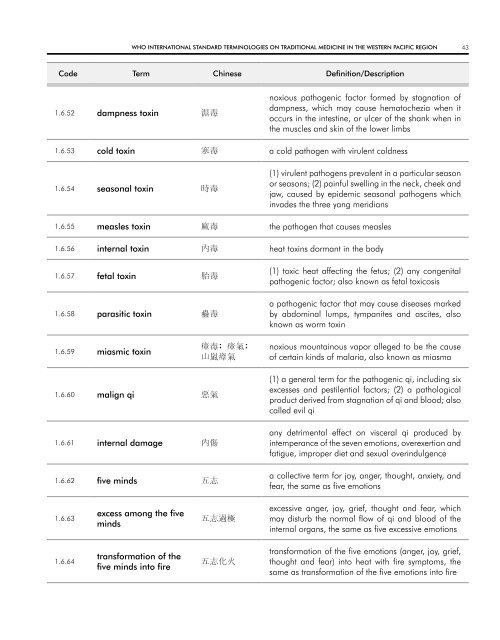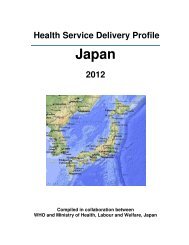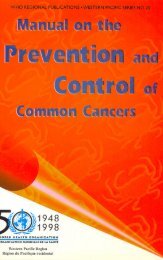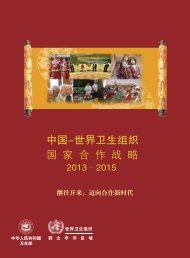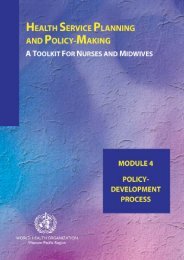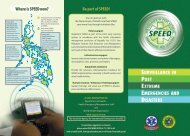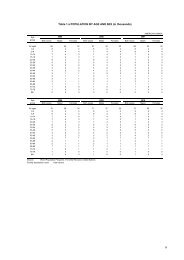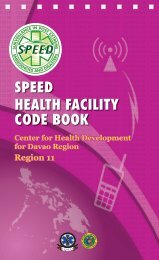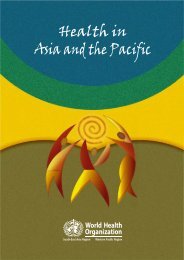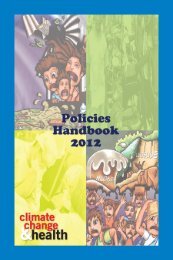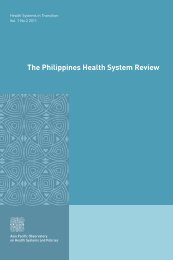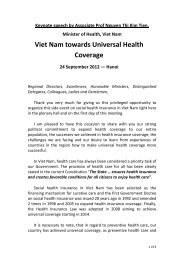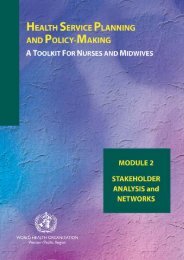- Page 3 and 4: WHO InternationalStandard Terminolo
- Page 5: TABLE OF CONTENTSFOREWORDACKNOWLEDG
- Page 11 and 12: WHO INTERNATIONAL STANDARD TERMINOL
- Page 13 and 14: WHO INTERNATIONAL STANDARD TERMINOL
- Page 15 and 16: WHO INTERNATIONAL STANDARD TERMINOL
- Page 17: TERMINOLOGIES
- Page 20 and 21: 10GeneralCode Term Chinese Definiti
- Page 22 and 23: 12Basic TheoriesCode Term Chinese D
- Page 24 and 25: 14Basic Theories - Essential Qi The
- Page 26 and 27: 16Basic Theories - Essence, Spirit,
- Page 28 and 29: 18Basic Theories - Essence, Spirit,
- Page 30 and 31: 20Basic Theories - Viscera and Bowe
- Page 32 and 33: 22Basic Theories - Viscera and Bowe
- Page 34 and 35: 24Basic Theories - Viscera and Bowe
- Page 36 and 37: 26Basic Theories - Viscera and Bowe
- Page 38 and 39: 28Basic Theories - Meridian and Col
- Page 40 and 41: 30Basic Theories - Meridian and Col
- Page 42 and 43: 32Basic Theories - Meridian and Col
- Page 44 and 45: 34Basic Theories - Body Constituent
- Page 46 and 47: 36Basic Theories - Body Constituent
- Page 48 and 49: 38Basic Theories - Cause of Disease
- Page 50 and 51: 40Basic Theories - Cause of Disease
- Page 54: 44Basic Theories - Cause of Disease
- Page 57 and 58: WHO INTERNATIONAL STANDARD TERMINOL
- Page 59 and 60: WHO INTERNATIONAL STANDARD TERMINOL
- Page 61 and 62: WHO INTERNATIONAL STANDARD TERMINOL
- Page 63: WHO INTERNATIONAL STANDARD TERMINOL
- Page 67 and 68: WHO INTERNATIONAL STANDARD TERMINOL
- Page 69 and 70: WHO INTERNATIONAL STANDARD TERMINOL
- Page 71 and 72: WHO INTERNATIONAL STANDARD TERMINOL
- Page 73 and 74: WHO INTERNATIONAL STANDARD TERMINOL
- Page 75 and 76: WHO INTERNATIONAL STANDARD TERMINOL
- Page 77 and 78: WHO INTERNATIONAL STANDARD TERMINOL
- Page 79 and 80: WHO INTERNATIONAL STANDARD TERMINOL
- Page 81 and 82: WHO INTERNATIONAL STANDARD TERMINOL
- Page 83 and 84: WHO INTERNATIONAL STANDARD TERMINOL
- Page 85 and 86: WHO INTERNATIONAL STANDARD TERMINOL
- Page 87 and 88: WHO INTERNATIONAL STANDARD TERMINOL
- Page 89 and 90: WHO INTERNATIONAL STANDARD TERMINOL
- Page 91 and 92: WHO INTERNATIONAL STANDARD TERMINOL
- Page 93 and 94: WHO INTERNATIONAL STANDARD TERMINOL
- Page 95 and 96: WHO INTERNATIONAL STANDARD TERMINOL
- Page 97 and 98: WHO INTERNATIONAL STANDARD TERMINOL
- Page 99 and 100: WHO INTERNATIONAL STANDARD TERMINOL
- Page 101 and 102: WHO INTERNATIONAL STANDARD TERMINOL
- Page 103 and 104:
WHO INTERNATIONAL STANDARD TERMINOL
- Page 105 and 106:
WHO INTERNATIONAL STANDARD TERMINOL
- Page 107 and 108:
WHO INTERNATIONAL STANDARD TERMINOL
- Page 109 and 110:
WHO INTERNATIONAL STANDARD TERMINOL
- Page 111 and 112:
WHO INTERNATIONAL STANDARD TERMINOL
- Page 113 and 114:
WHO INTERNATIONAL STANDARD TERMINOL
- Page 115 and 116:
WHO INTERNATIONAL STANDARD TERMINOL
- Page 117 and 118:
WHO INTERNATIONAL STANDARD TERMINOL
- Page 119 and 120:
WHO INTERNATIONAL STANDARD TERMINOL
- Page 121 and 122:
WHO INTERNATIONAL STANDARD TERMINOL
- Page 123 and 124:
WHO INTERNATIONAL STANDARD TERMINOL
- Page 125 and 126:
WHO INTERNATIONAL STANDARD TERMINOL
- Page 127 and 128:
WHO INTERNATIONAL STANDARD TERMINOL
- Page 129 and 130:
WHO INTERNATIONAL STANDARD TERMINOL
- Page 131 and 132:
WHO INTERNATIONAL STANDARD TERMINOL
- Page 133 and 134:
WHO INTERNATIONAL STANDARD TERMINOL
- Page 135 and 136:
WHO INTERNATIONAL STANDARD TERMINOL
- Page 137 and 138:
WHO INTERNATIONAL STANDARD TERMINOL
- Page 139 and 140:
WHO INTERNATIONAL STANDARD TERMINOL
- Page 141 and 142:
WHO INTERNATIONAL STANDARD TERMINOL
- Page 143 and 144:
WHO INTERNATIONAL STANDARD TERMINOL
- Page 145 and 146:
WHO INTERNATIONAL STANDARD TERMINOL
- Page 147 and 148:
WHO INTERNATIONAL STANDARD TERMINOL
- Page 149 and 150:
WHO INTERNATIONAL STANDARD TERMINOL
- Page 151 and 152:
WHO INTERNATIONAL STANDARD TERMINOL
- Page 153 and 154:
WHO INTERNATIONAL STANDARD TERMINOL
- Page 155 and 156:
WHO INTERNATIONAL STANDARD TERMINOL
- Page 157 and 158:
WHO INTERNATIONAL STANDARD TERMINOL
- Page 159 and 160:
WHO INTERNATIONAL STANDARD TERMINOL
- Page 161 and 162:
WHO INTERNATIONAL STANDARD TERMINOL
- Page 163 and 164:
WHO INTERNATIONAL STANDARD TERMINOL
- Page 165 and 166:
WHO INTERNATIONAL STANDARD TERMINOL
- Page 167 and 168:
WHO INTERNATIONAL STANDARD TERMINOL
- Page 169 and 170:
WHO INTERNATIONAL STANDARD TERMINOL
- Page 171 and 172:
WHO INTERNATIONAL STANDARD TERMINOL
- Page 173 and 174:
WHO INTERNATIONAL STANDARD TERMINOL
- Page 175 and 176:
WHO INTERNATIONAL STANDARD TERMINOL
- Page 177 and 178:
WHO INTERNATIONAL STANDARD TERMINOL
- Page 179 and 180:
WHO INTERNATIONAL STANDARD TERMINOL
- Page 181 and 182:
WHO INTERNATIONAL STANDARD TERMINOL
- Page 183 and 184:
WHO INTERNATIONAL STANDARD TERMINOL
- Page 185 and 186:
WHO INTERNATIONAL STANDARD TERMINOL
- Page 187 and 188:
WHO INTERNATIONAL STANDARD TERMINOL
- Page 189 and 190:
WHO INTERNATIONAL STANDARD TERMINOL
- Page 191 and 192:
WHO INTERNATIONAL STANDARD TERMINOL
- Page 193 and 194:
WHO INTERNATIONAL STANDARD TERMINOL
- Page 195 and 196:
WHO INTERNATIONAL STANDARD TERMINOL
- Page 197 and 198:
WHO INTERNATIONAL STANDARD TERMINOL
- Page 199 and 200:
WHO INTERNATIONAL STANDARD TERMINOL
- Page 201 and 202:
WHO INTERNATIONAL STANDARD TERMINOL
- Page 203 and 204:
WHO INTERNATIONAL STANDARD TERMINOL
- Page 205 and 206:
WHO INTERNATIONAL STANDARD TERMINOL
- Page 207 and 208:
WHO INTERNATIONAL STANDARD TERMINOL
- Page 209 and 210:
WHO INTERNATIONAL STANDARD TERMINOL
- Page 211 and 212:
WHO INTERNATIONAL STANDARD TERMINOL
- Page 213 and 214:
WHO INTERNATIONAL STANDARD TERMINOL
- Page 215 and 216:
WHO INTERNATIONAL STANDARD TERMINOL
- Page 217 and 218:
WHO INTERNATIONAL STANDARD TERMINOL
- Page 219 and 220:
WHO INTERNATIONAL STANDARD TERMINOL
- Page 221 and 222:
WHO INTERNATIONAL STANDARD TERMINOL
- Page 223 and 224:
WHO INTERNATIONAL STANDARD TERMINOL
- Page 225 and 226:
WHO INTERNATIONAL STANDARD TERMINOL
- Page 227 and 228:
WHO INTERNATIONAL STANDARD TERMINOL
- Page 229 and 230:
WHO INTERNATIONAL STANDARD TERMINOL
- Page 231 and 232:
WHO INTERNATIONAL STANDARD TERMINOL
- Page 233 and 234:
WHO INTERNATIONAL STANDARD TERMINOL
- Page 235 and 236:
WHO INTERNATIONAL STANDARD TERMINOL
- Page 237 and 238:
WHO INTERNATIONAL STANDARD TERMINOL
- Page 239 and 240:
WHO INTERNATIONAL STANDARD TERMINOL
- Page 241 and 242:
WHO INTERNATIONAL STANDARD TERMINOL
- Page 243 and 244:
WHO INTERNATIONAL STANDARD TERMINOL
- Page 245 and 246:
WHO INTERNATIONAL STANDARD TERMINOL
- Page 247 and 248:
WHO INTERNATIONAL STANDARD TERMINOL
- Page 249 and 250:
WHO INTERNATIONAL STANDARD TERMINOL
- Page 251 and 252:
WHO INTERNATIONAL STANDARD TERMINOL
- Page 253 and 254:
WHO INTERNATIONAL STANDARD TERMINOL
- Page 255 and 256:
WHO INTERNATIONAL STANDARD TERMINOL
- Page 257 and 258:
WHO INTERNATIONAL STANDARD TERMINOL
- Page 259 and 260:
WHO INTERNATIONAL STANDARD TERMINOL
- Page 261 and 262:
WHO INTERNATIONAL STANDARD TERMINOL
- Page 263 and 264:
WHO INTERNATIONAL STANDARD TERMINOL
- Page 265 and 266:
WHO INTERNATIONAL STANDARD TERMINOL
- Page 267 and 268:
WHO INTERNATIONAL STANDARD TERMINOL
- Page 269 and 270:
WHO INTERNATIONAL STANDARD TERMINOL
- Page 271 and 272:
WHO INTERNATIONAL STANDARD TERMINOL
- Page 273 and 274:
WHO INTERNATIONAL STANDARD TERMINOL
- Page 275 and 276:
WHO INTERNATIONAL STANDARD TERMINOL
- Page 277 and 278:
WHO INTERNATIONAL STANDARD TERMINOL
- Page 279 and 280:
WHO INTERNATIONAL STANDARD TERMINOL
- Page 281 and 282:
WHO INTERNATIONAL STANDARD TERMINOL
- Page 283 and 284:
WHO INTERNATIONAL STANDARD TERMINOL
- Page 285 and 286:
WHO INTERNATIONAL STANDARD TERMINOL
- Page 287 and 288:
WHO INTERNATIONAL STANDARD TERMINOL
- Page 289 and 290:
WHO INTERNATIONAL STANDARD TERMINOL
- Page 291 and 292:
WHO INTERNATIONAL STANDARD TERMINOL
- Page 293 and 294:
WHO INTERNATIONAL STANDARD TERMINOL
- Page 295:
INDEX
- Page 298 and 299:
288IndexTerm Code Pageanhidrosis 2.
- Page 300 and 301:
290IndexTerm Code Pageblood-nourish
- Page 302 and 303:
292IndexTerm Code Pageclear the qi
- Page 304 and 305:
294IndexTerm Code Pagecrossing poin
- Page 306 and 307:
296IndexTerm Code Pagediffuse imped
- Page 308 and 309:
298IndexTerm Code Pagedry retching
- Page 310 and 311:
300IndexTerm Code Pageessence-spiri
- Page 312 and 313:
302IndexTerm Code Pagefavorable pat
- Page 314 and 315:
304IndexTerm Code Pagefortify the s
- Page 316 and 317:
306IndexTerm Code Pagehand-holding
- Page 318 and 319:
308IndexTerm Code Pagehemiplegia 3.
- Page 320 and 321:
310IndexTerm Code Pageinterior exce
- Page 322 and 323:
312IndexTerm Code Pagelatent meridi
- Page 324 and 325:
314IndexTerm Code Pagelower abdomen
- Page 326 and 327:
316IndexTerm Code Pagemeridian-indu
- Page 328 and 329:
318IndexTerm Code Pageneedling-proh
- Page 330 and 331:
320IndexTerm Code PageTerm Code Pag
- Page 332 and 333:
322IndexTerm Code PageTerm Code Pag
- Page 334 and 335:
324IndexTerm Code PageTerm Code Pag
- Page 336 and 337:
326IndexTerm Code Pagepattern/syndr
- Page 338 and 339:
328IndexTerm Code Pagepulling manip
- Page 340 and 341:
330IndexTerm Code Pagerelax sinews
- Page 342 and 343:
332IndexTerm Code Pagesecure essenc
- Page 344 and 345:
334IndexTerm Code Pagesoothe the li
- Page 346 and 347:
336IndexTerm Code Pagestomach defic
- Page 348 and 349:
338IndexTerm Code PagesyncopeT2.1.8
- Page 350 and 351:
340IndexTerm Code Pagetorpid intake
- Page 352 and 353:
342IndexTerm Code Pageununited skul
- Page 354 and 355:
344IndexTerm Code Pagewarm the stom
- Page 356 and 357:
346IndexTerm Code Pageyang exuberan
- Page 359 and 360:
WHO INTERNATIONAL STANDARD TERMINOL
- Page 361 and 362:
WHO INTERNATIONAL STANDARD TERMINOL
- Page 363 and 364:
WHO INTERNATIONAL STANDARD TERMINOL
- Page 365 and 366:
WHO INTERNATIONAL STANDARD TERMINOL


